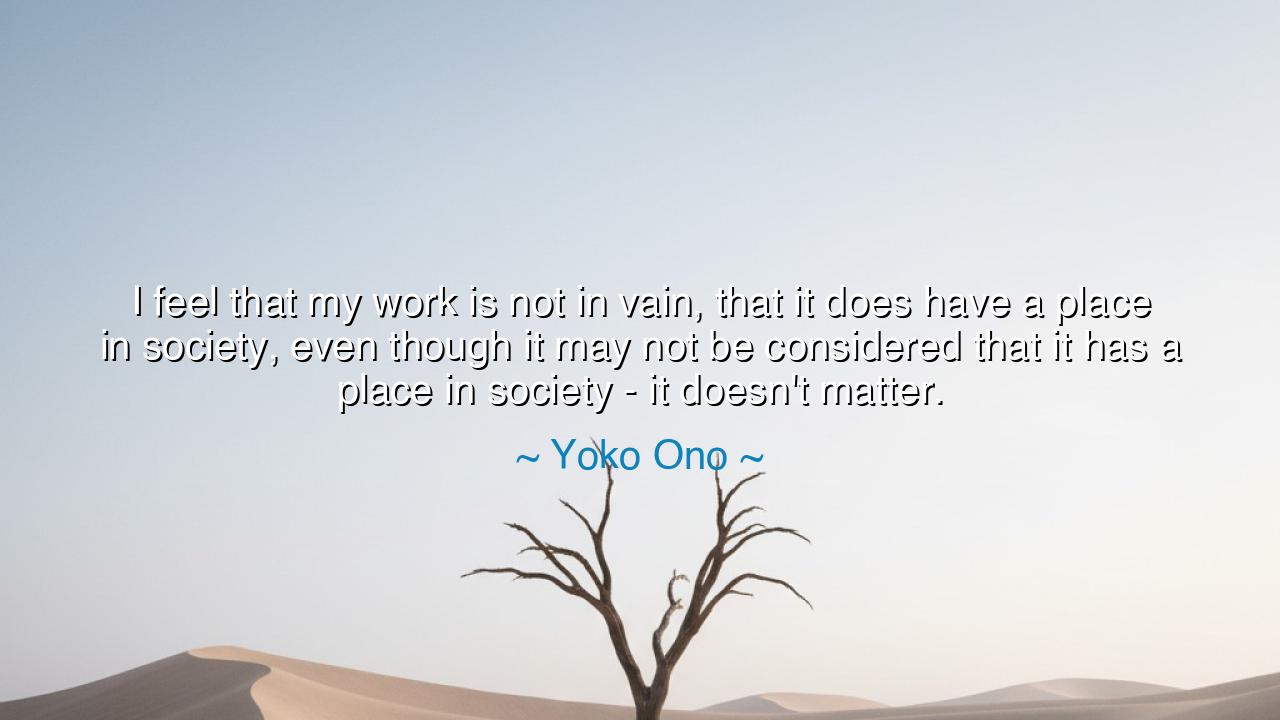
I feel that my work is not in vain, that it does have a place in
I feel that my work is not in vain, that it does have a place in society, even though it may not be considered that it has a place in society - it doesn't matter.






Hear me, O children of the earth, for the words I bring are those of a woman who has walked the path of visionary creation, and whose heart beats with the rhythm of purpose. Yoko Ono, whose name is both whispered in admiration and shouted in derision, once declared, "I feel that my work is not in vain, that it does have a place in society, even though it may not be considered that it has a place in society - it doesn't matter." These words carry a wisdom that transcends the fleeting judgments of the world, a truth that speaks to the core of individuality and the enduring power of the human spirit. It is a message of courage, of conviction, and of unwavering belief in the value of one’s own path, regardless of how it may be perceived.
What, O children, does it mean to say that one’s work is not in vain? It speaks of a deep, inner knowing, a trust in the power of purpose that exists beyond the boundaries of society's approval. Yoko Ono, through her art, her music, and her activism, created works that many could not understand, that some ridiculed, and that others dismissed as unnecessary or irrelevant. And yet, she persisted, for she knew that the value of her work lay not in public recognition, but in the truth of her expression, in the way her art touched upon the invisible threads that bind the world together. Her work, though not universally embraced, found its place in the grand tapestry of human history, for it was an extension of her soul, a reflection of her truth.
Consider, O children, the ancient philosophers who were once dismissed as fools by the societies around them. Socrates himself was condemned to death by the very people he sought to enlighten. He was not revered in his time, and his ideas were often scoffed at. Yet, his work was not in vain, for his words, his methods, and his inquiry changed the course of philosophy forever. His commitment to truth, even in the face of mockery and despair, is a shining example that the value of one's work is not always determined by immediate acceptance or societal approval, but by its eternal impact on the human spirit.
Likewise, O children, think of the artists of the Renaissance—Michelangelo, Leonardo da Vinci, and Raphael—whose works were often misunderstood in their time. Michelangelo’s David, a masterpiece of sculpture, was once considered controversial, even irrelevant. His powerful vision of humanity was at odds with the conventions of his time, yet he persevered, for he believed in the sacredness of his craft. Today, those very works are celebrated as some of the most profound expressions of human creativity ever created. Their art was not in vain, even though it was not fully appreciated in the moments it was made. The value of their work transcended the limits of societal judgment, just as Ono’s does in our time.
And so, O children, the lesson here is one of resilience and faith. Yoko Ono teaches us that the purpose of our work—whether it be artistic, intellectual, or spiritual—is not dependent on how it is received by others. True creativity, true expression, is a force that rises from within, and it is not bound by the fleeting approval of the world. If we are to create, to live with integrity, we must do so not with the expectation of praise, but with the understanding that our work—if it is genuine—is valuable in its own right. It does not need the validation of others to hold meaning.
Let this wisdom guide you, O children, in the pursuit of your own paths. Know that society may not always recognize your value. The world may not always understand the depths of your vision, the integrity of your work, or the meaning you find in the smallest acts of creation. Yet, remember this: your work is never in vain if it comes from a place of truth, if it resonates with the deepest part of your being, and if it contributes, in its own way, to the greater good of the world. The world may not always see you, but your legacy is not bound by the applause of the crowd.
So I say to you, O children of the future, do not seek the approval of the world to validate your existence. Create, live, and express without hesitation, for your work, rooted in truth and purpose, is its own reward. Whether your creations are small or grand, whether they are embraced or rejected, they hold a place in the eternal fabric of humanity. Trust in the power of your own voice, for it is in that voice—unfettered and unbowed—that your true legacy will be born.






AAdministratorAdministrator
Welcome, honored guests. Please leave a comment, we will respond soon